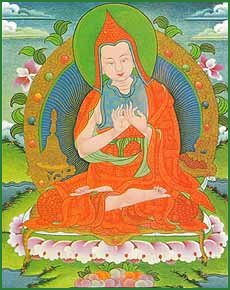The Great Chariot
by Longchenpa | 268,580 words
A Commentary on Great Perfection: The Nature of Mind, Easer of Weariness In Sanskrit the title is ‘Mahāsandhi-cittā-visranta-vṛtti-mahāratha-nāma’. In Tibetan ‘rDzogs pa chen po sems nyid ngal gso’i shing rta chen po shes bya ba ’...
Part 12 - Instantaneous Impermanence
Not only do we die if we have such afflictions, but even if we have no afflictions, the life of sentient beings is still passing away:
Even with no afflictions, the life of beings is passing.
Day and night, with the passing of every moment or instant,
It is always approaching the land of the Lord of Death.
As over waterfalls, water flows into the ocean,
Or far to the west the sun declines until it sets.
Even though there are lives where someone can say, "I have not been harmed by incidental affliction," and though there are teachings that extend life with appropriate food and potions[1] and so forth, in the end it is of no use--we have to enter death. The Bodhicaryavatara says:
Though seemingly today, I am without any illness,
Even if I have food and am without affliction,
This life is still no more than an illusory instant,
This body is no more than a momentary reflection.
About life not lasting for even a moment, the Pinnacle of Precious Gathering (a’dus pa rin po che’i tog) says:
Subhuti said, "The life of beings is like a waterfall.
The scriptures of monastic discipline say:
Steep mountain streams descend into the sea
The sun and moon sink down behind the western mountains.
Day and night tick off their fragmentary instants.
Like these, the life of beings must pass and disappear.
Footnotes and references:
[1]:
